Hijab Girls (And More) By Cory Eldridge
Susan notes: this beautiful piece by Cory Eldridge found me in a roundabout way. Someone had posted a link to another story by Eldridge on a blog that I follow.
After I savoured the short essay, which I can only describe as one of the best pieces of writing about expat workers that I have ever read, I scrolled down to find the one below about two young Muslim girls in an American schoolyard. It's also beautiful. And particularly touching given the recent stabbing murder of Marwa Sherbini, 31, an Egyptian woman living in Germany.
Click here to read Cory Eldridge's stunningly well-written article about his experience living as an American expat intern reporter, with a group of Asian expat workers, in close quarters, in Sharjah, UAE. It's an outstanding piece of journalistic writing. Click here to go to his blog.
Hijab Girls
 If you were to guess which two of these things were not like the others things, which two of these things don’t belong during recess at Glencoe Elementary you would pick these two girls. Because you saw that unlike the others they wear headscarves, bright flower-covered hijabs, with matching straight-waist dresses.
If you were to guess which two of these things were not like the others things, which two of these things don’t belong during recess at Glencoe Elementary you would pick these two girls. Because you saw that unlike the others they wear headscarves, bright flower-covered hijabs, with matching straight-waist dresses.
They always walk alone, together. Hand holds little hand while the other kids yell and run and chase, going this way then twirling and going that way. They walk straight, not in lockstep but in rhythm. Those are the eye-catching children on a schoolyard: the still ones, the deliberate ones, the un-childlike. The ones by themselves. They seem like little adults or dreamers, but mostly they seem overcome by melancholy.
I see them maybe once a week as I run pass the school during my first mile, and they hold their heads close, sharing secrets and stories, as they walk alone, together. I’ve decided they are Somalis, the daughters of refugees floating in a city far from their embattled home, waiting to go back, dressing their children as they will when they return, watching their melancholy become their children’s as the news comes in and, again, it’s bad.
I run by, making up stories, and the girls walk hand in hand, whispering to each other, remaining unlike the others and more and more like themselves.
- Tags: community connection education Islam kids